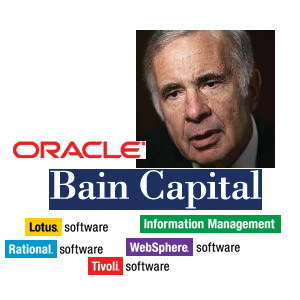Will Oracle or Private Equity Gobble Up the High Tech World?
 Over the past two decades, the high technology sector has generally been the purview of venture capitalists and investment banks financing and brokering acquisitions and selling IPOs. It was 2004 when Oracle's board of directors made a couple of important realizations that high switching cost made it cheaper to buy the competitor than to outsell the competitor to gain the competitor's customers and began their acquisition binge of ERP and CRM companies – PeopleSoft, J.D. Edwards, Siebel Systems, and dozes of other software companies with similar mature market positions in the enterprise software, enterprise application segments they serve.
Over the past two decades, the high technology sector has generally been the purview of venture capitalists and investment banks financing and brokering acquisitions and selling IPOs. It was 2004 when Oracle's board of directors made a couple of important realizations that high switching cost made it cheaper to buy the competitor than to outsell the competitor to gain the competitor's customers and began their acquisition binge of ERP and CRM companies – PeopleSoft, J.D. Edwards, Siebel Systems, and dozes of other software companies with similar mature market positions in the enterprise software, enterprise application segments they serve.
IBM Software divisions have made the same realization with deals covering Lotus, Rational, WebSphere, Information Management and Tivoli software units.
Private equity has taken big chomps out of this market too. TheOntario Teacher's Pension Fund's purchase of BCE happened because thereare so few investment vehicle outlets available to their billions, andbeing a utility stock certainly helped their choice of the Canadian MaBell. Similarly, Enterasys, 3Com and Avaya have gone investor-quiet,since going private. Certainly their marketing budgets have notreflected the lack of institutionally-required investor informationabout the company and what's going on (good/bad etc), but ink is inkand customers are often investors too.
However, more recentlyeven activist investors are engaging with the dialog. A fighting storyaffecting the niche wireless software company – OpenWave and its second largest investor, Harbinger involved the acquisition of shares, replacement of directors, cash bidfor a portion of OpenWave and merger with the carrier Fixed-MobileConvergence player BridgePort Networks in the spring of 2007, whichexpired. The CEO, Peterschmidt left, and most of, if not all, of themanagement team was replaced.
Now [[Carl Icahn]], the activist investor famous for his 1985 hostile takeover of TWA, is weighing in on the BEA-Oracle deal. What's going on in high technology?
The Standard & Poor's says:
Technology stocks are trading at average price-to-earnings of only 20.09 times 2008 earnings compared to 65.5 times per share in 2002.
Why is this happening?
It's happening because high technology companies' DNA has been wired to grow, but the markets they serve have not been growing much anymore. The real high tech growth markets of India and China are not particularly good for software due to the nature of the intellectual property protections (or lack of them) in those markets, which leaves those markets to growing indigenous players, and stagnant stocks for US investors.
In mature markets, innovating your way out is not a short term option. Shareholders, especially activist investors have short timetables for change. They're looking to stimulate some form of transformational change to unlock the value of the enterprise they partly own. Acquisition or be acquired are about the only ways out. Management can entrench themselves, but how can fighting with your shareholders create more value for them?
What to expect going forward?
More of the same. With big companies – [[Cisco]], [[HP]], [[Microsoft]], [[Google]], [[IBM]], [[SAP]] and [[Oracle]] all acquiring product and services companies to achieve their ever-growing business goals and with private equity acquiring companies without the drama of activist investors, it is clear that the high technology industry has reached a plateau and the industry needs a transformation which is going on right now. As these companies acquire with stock, they will also put their enormous cash reserves and cash gains to work by reducing the shares outstanding, as a way to assure growth in stock value and boost the value of their currency.
Lesser managed companies will opt for the private route to protect the management from the distraction of activists and promise outsized returns for the new owners. 3Com is a case in point. Public investors did not respect the management team, nor value the base business as shown by my analysis. Besides, there are plenty of potential deals out there – the US Census reports that there are over 12,000 software companies in America. This is like the banking consolidation of the past decade. It's the only way to unlock value for shareholders.
This post has already been read 0 times!
Edit
